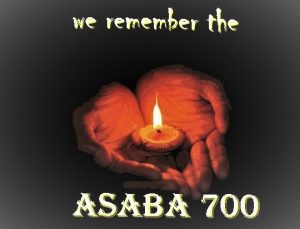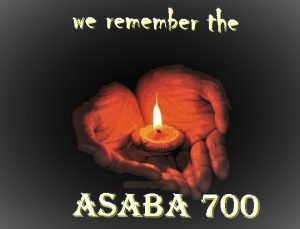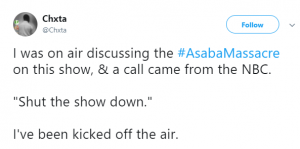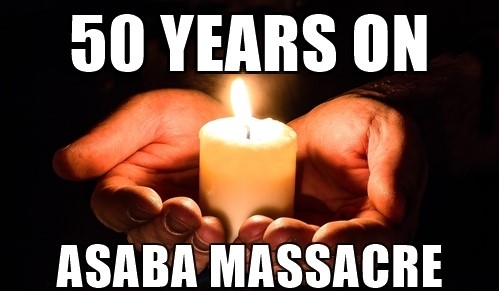

“They were honest with us, they told us they were going to kill us. They took us to the mounted machine guns. Then it dawned on us that it was true. I was standing with my older brother at the edge of the crowd. He was holding my hand. He had always taken care of me. We shared the same bed. He was the first to be dragged away by the soldiers. He let go of my hand and pushed me into the crowd. He was shot in the back. I could see the blood gushing from his back. He was the first victim of the massacre. Then all hell let loose.” ~ Uraih.
A graphic account of what transpired after Federal troops led by Murtala Mohammed repelled Biafran forces from Benin, the Biafrans retreated across the Niger and blew up the eastern end of the bridge to prevent the Federal troops from advancing further. The Federal soldiers invaded the peaceful town of Asaba, accusing them of being Biafran sympathisers, killing, maiming and raping at will.
On October 7, 1967, the elders of the town in a bid to prevent further killings agreed with the soldiers to assemble their families to show their support for “One Nigeria.” Clad in the ceremonial Akwa-Ocha they sang and danced waving their flags unaware they had been coaxed to lure out the men to Ogbe-Osowa village square. As the soldiers separated the men and started killing them, there was pandemonium, they opened fire and about 700 innocent young men and kids were slaughtered in what became known as the Asaba Massacre.
If this meticulously planned and publicly executed massacre is not genocide then I wonder what is?
A few days ago I watched with elation as Governor Okowa of Delta state handed out starter packs to 65 Akwa-Ocha trainees at the graduation ceremony of the Delta State Leather Works/Shoe Factory, Issele-Uku. My joy stemmed partly from an earlier report I read about the increasing demand for the culturally significant Akwa-Ocha and the fact that the Delta state government was supporting locals to improve its economic viability as a product.
My Godfather is from Asaba. The late Chief Eboka, a fair handsome man who helped my late dad climb through the ranks in UTC. May God rest their souls. I have lived in Asaba too, anybody who has come in contact with the people will tell you that they are wonderfully hospitable. For a people who suffered grave injustice from both sides of the divide during the 30-month conflict, you have to respect their resilience and admire their free spirit. It was Wole Soyinka who said that:
“the Ahaba Man became the most vulnerable Nigerian..It required ten positive acts of loyalty to one of the rest of the nation to prove themselves human beings. Ever since the Mid-western invasion, they (Ahaba People) had been hounded, killed and considered the greatest security risks than the rest Igbos” ~ The Man Died
Yet these are one of the most peace-loving and easy-going people you will come across. I will always remember the days spent at the mechanic workshop where I went for repairs. The boys were so lively, they had a lovely way of blending work and fun, sliding beneath vehicles to fix faults while bantering away in their slinky dialect. Asaba people are not the type to bear grudges which is why I believe they have long forgiven.
So when I saw a piece online suggesting that General Murtala Mohammed should be stripped of his honours posthumously and his face removed from the N20 note my initial reaction was to disagree. I wanted to query the benefit of such action.
What is life after all I pondered? Murtala allegedly gave the order while Colonel Ibrahim Taiwo executed it. Murtala was to become the Head of state in 1975 and rewarded Taiwo by appointing him the Governor of Kwara state. Both were assassinated seven months later on February 13th, 1976. But on second thought I remembered that the state of Louisana recently pulled down Confederate monuments that represented the ugly history of white supremacy and slavery in Southern America. Statues like that of General Robert Lee, an iconic civil war commander bit the dust.

If that could happen after a hundred and fifty years then, by all means, let us replicate it here. We cannot continue suppressing the ugly tales by yanking people off air. We must publicly discuss these things, because not only is it informing, it can be soothing as well. If we do not want Nigeria to keep stumbling, then we shouldn’t leave our history to be told by Elizabeth Bird and Fraser Ottanelli. If we want proper reconciliation that will be the bedrock of nation-building then we must be courageous enough to start correcting the mistakes of the past.
We are Africans, we believe in the potency of the spirit of our ancestors. Horrific events of the past will continue to haunt Nigeria if proper appeasement and atonement are not carried out.
Someone once said that in Nigeria we die in numbers and not in names, in other words, whereas the figures (often disputed by the way) are documented, very little attempt is made to immortalise the dead. Perhaps the Nigerian Head of State at the time General Yakubu Gowon realised this when he profusely apologised at a rally held in Asaba township stadium in 2002. For the survivors and victims’ families, a public acknowledgement of the deaths and a proper apology from the Federal Government will act as a conciliating embrocation just as the permanent memorial to their lost loved ones will immortalise their names.
We will forgive but we should NEVER forget.
May the Asaba memorial always remind us of the horrors of war, so that everyone, especially the elders will propagate dialogue as the best means of arbitration in times of dispute to prevent a repeat of such mindless genocide. More importantly, may such incidents embolden us to always demand justice, equity and fairness.
May God bless the good people of Asaba where I once lived and built great relationships that will last a lifetime.






